Saturday, September 29, 2007
Harasho Masheenas
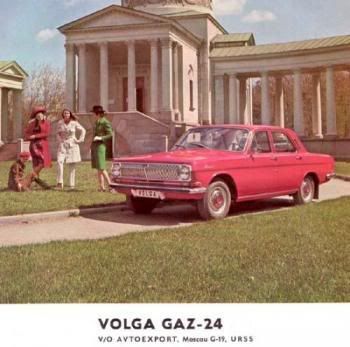
Caspian Scene, an English-language magazine we picked up in Baku, had a lot of useful information on the city's dining scene, but other than that it was essentially the sounding board for a lady named Sandra Cummming. Sandra wrote almost every article in the magazine, and displayed encyclopedic knowledge. One was about the possible Caucasus origins of the Norse people. Ever wonder why they have a god called Aser? Hm? Or why white people are called Caucasian? Another article was on Russian car makes - the hardy UAZ, GAZ and KamAZ. Sandra refers to them collectively as “harasho masheenas,” a butchering of the Russian khoroshiye mashiny (good cars) that she apparently picked up from one of her many drivers.
"One essential feature of life in post-Soviet Central Asian countries is the existence of sturdy Russian vehicles," she writes. "These are best seen in action where life is sometimes tough with the terrain to match." Sing it, Sandy. We experienced this first-hand a couple weeks after reading the Collected Works of Sandra Cumming when traveling through the tough-as-nails Pamirs, where even the parts that are "paved" have potholes like craters.
The Toyota van we started out with Khorog became useless after reaching Alichur three grueling days into the four-day journey, and we had to get through the rest of Tajikistan and into Kyrgyzstan on a Lada and a Volga. I should note that both of these broke down on the road as well, but were up and runnning again after a few slaps and taps - not like Japanese cars, which require serious, sophisticated care from a professional to solve their problems. If only I could bring a Volga to the U.S. with me...
Stay Classy, Alichur
On our final day in the Pamirs, we met with disaster: our car broke down. Now, you might be asking yourself, what's the big deal? Just hire another car. If you did ask yourself that, you have never been to Alichur.
Alichur is about halfway between Khorog and Mugrab on the Pamir Highway. In other words, its in the middle of nowhere. When it started to become apparent that our car might not be fixed that day (and we couldn't wait around for it to be fixed, because my visa ran out the following day), we began to ask around about other transport. I was told by one man that we had best wait for out driver to fix the van, because cars don’t generally stop in Alichur, and the village itself had no vehicles in working order.
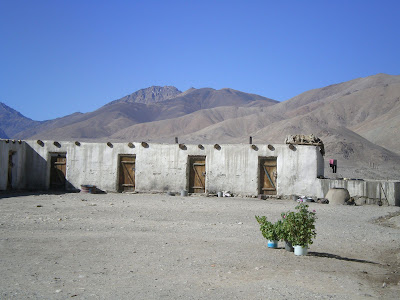 Downtown Alichur.
Downtown Alichur.
Rather than sit around and bemoan our lack of transport, we decided to take a little hike around the Pamirs. The Pamir Region of Tajikistan as also known by the locals as the “Roof of the World.” Alichur’s elevation is around 4000m, and supposedly the plain surrounding it is one of the most fertile in the Pamirs, but it still looked rather barren to us. The entire Pamir region is extremely poor, and Alichur seemed to be no exception. One of the men explained to us that the reason the village didn’t have electricity is that years ago someone had stolen all the copper wire to sell for scrap. Most of the men go to Moscow to work – in fact, almost every man we talked to had just come back from or was just leaving for Russia. Ever the capitalists, after hiking up one of the hills outside of town we contemplated how Alichur could boost its economy. We began by brainstorming their natural resources, but only got as far as rocks and mountains. Other than mountain tourism and stone masonry, we were at a loss for how Alichur could market itself in the 21st Century.
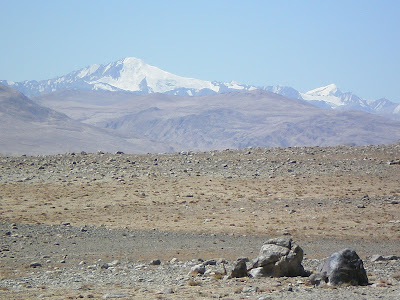
Rocks and Mountains.
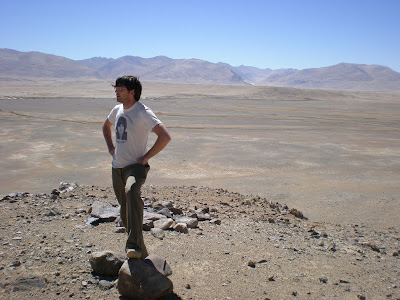
On the Roof of the World!
Despite their isolation, the people in Alichur were amazingly kind and welcoming. While they told us they see about one group of tourists a day pass through during the summer, we were told by one man that we were the first Russophone tourists they had ever met, so we were a big hit around town. As I sat around assessing the progress being made on our car, I was approached by the man who we would call The Boss, as it fast became clear that all decisions in Alichur had to pass by him. And with his stylish aviators and dapper sports coat, Alichur could have no finer boss man.
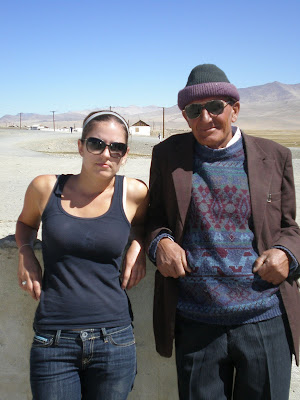 Me and The Boss.
Me and The Boss.
Later my eye was caught by the whimsical fashion choices of another man about town. He seemed to be the village hipster, and thus we dubbed him the Pamipster. While in retrospect it seems so obvious, we didn’t learn until later that evening that The Boss was the Pamipster’s father.
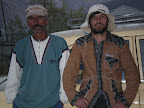
Driver Maksin and the Pamipster
Later in the afternoon, with there being no sign that the van would be fixed any time soon, the Pamipster and Maksin (a guy with a car) volunteered to take us to Murghab, where we could hop a shared van out of the country. After 30 minutes or so tinkering with their car and coaxing it into motion (including pushing it down a hill to get the engine started), the Pamipster and friend rolled by to pick us up and we said our good-byes to the wonderful people of Alichur.
Upon arriving in Murghab and finding us a suitably dodgy hotel, the Pamipster and Maksin went straight for the nearest store, returning with a bottle of vodka. We could think of no better ending to our day in Alichur.
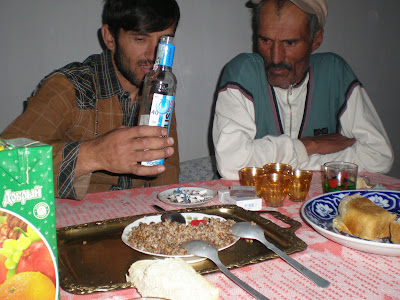
Only in a former Soviet republic could buckwheat count as a chaser.
Alichur is about halfway between Khorog and Mugrab on the Pamir Highway. In other words, its in the middle of nowhere. When it started to become apparent that our car might not be fixed that day (and we couldn't wait around for it to be fixed, because my visa ran out the following day), we began to ask around about other transport. I was told by one man that we had best wait for out driver to fix the van, because cars don’t generally stop in Alichur, and the village itself had no vehicles in working order.
Rather than sit around and bemoan our lack of transport, we decided to take a little hike around the Pamirs. The Pamir Region of Tajikistan as also known by the locals as the “Roof of the World.” Alichur’s elevation is around 4000m, and supposedly the plain surrounding it is one of the most fertile in the Pamirs, but it still looked rather barren to us. The entire Pamir region is extremely poor, and Alichur seemed to be no exception. One of the men explained to us that the reason the village didn’t have electricity is that years ago someone had stolen all the copper wire to sell for scrap. Most of the men go to Moscow to work – in fact, almost every man we talked to had just come back from or was just leaving for Russia. Ever the capitalists, after hiking up one of the hills outside of town we contemplated how Alichur could boost its economy. We began by brainstorming their natural resources, but only got as far as rocks and mountains. Other than mountain tourism and stone masonry, we were at a loss for how Alichur could market itself in the 21st Century.
Rocks and Mountains.
On the Roof of the World!
Despite their isolation, the people in Alichur were amazingly kind and welcoming. While they told us they see about one group of tourists a day pass through during the summer, we were told by one man that we were the first Russophone tourists they had ever met, so we were a big hit around town. As I sat around assessing the progress being made on our car, I was approached by the man who we would call The Boss, as it fast became clear that all decisions in Alichur had to pass by him. And with his stylish aviators and dapper sports coat, Alichur could have no finer boss man.
Later my eye was caught by the whimsical fashion choices of another man about town. He seemed to be the village hipster, and thus we dubbed him the Pamipster. While in retrospect it seems so obvious, we didn’t learn until later that evening that The Boss was the Pamipster’s father.
Driver Maksin and the Pamipster
Later in the afternoon, with there being no sign that the van would be fixed any time soon, the Pamipster and Maksin (a guy with a car) volunteered to take us to Murghab, where we could hop a shared van out of the country. After 30 minutes or so tinkering with their car and coaxing it into motion (including pushing it down a hill to get the engine started), the Pamipster and friend rolled by to pick us up and we said our good-byes to the wonderful people of Alichur.
Upon arriving in Murghab and finding us a suitably dodgy hotel, the Pamipster and Maksin went straight for the nearest store, returning with a bottle of vodka. We could think of no better ending to our day in Alichur.
Only in a former Soviet republic could buckwheat count as a chaser.
Grandpa Sass
One overnight stay in the Wakhan Vallery was in the village of Ptup, at the homestead of an old man whose tongue was so sharp we called him Grandpa Sass. He seemed to take great pleasure in ordering around Habib, our driver, and his two assistants, and engaged us in talks about politics. Like all Tajiks, he hates the Tajik president and had a few sassy comments about him. Then we talked a little about American politics, too, but here the sophistication of the discussion was limited by his small knowledge of how power changes hands in our nation.
"Do you want to assassinate Bush?" Grandpa Sass asked me.
"No, I can't do that!" I replied.
"If you hate him so much, kill him!" he said.
Maybe his understanding of the United States has been skewed by watching too many Steven Segal movies. After Grandpa Sass was done talking about how things were better under Brezhnev, we popped "Today You Die" into the DVD player, which must have been powered by some kind of generator because Ptup hasn't had electricity since the Soviet Union fell apart.

Sass' Choice
The next morning we were served a breakfast of bread and syrchoi, a milky, salty tea. For a heartier meal the guys from the van got a big can of gunky, congealed vegetable oil and spooned it into their bowls. Yellow slicks formed at the top. It made me a little queasy.
"Put some oil in your tea," Grandpa Sass commanded.
"No thanks," I said.
"They're doing it, so you have to do it too," he said. "This isn't America, this is the Soviet Union."
The al fresco dining room chez Sass
When Liz joined the table he came up with a slightly subtler form of persuasion. "You have to add oil to lube it up," he told Liz. "Otherwise the syrchoi won't work." Liz pantomimed adding a gob. Smart move.
Then it was time to say goodbye to Ptup and our sassy host.
The Manhattan of the Pamirs
From Khorog, we hired a car to take us through the Pamirs. Our driver, Habib, brought along two “helpers”, his brother and neighbor. With our hot Pamir ride sorted out, we began by detouring from the Pamir Highway to go through the Wakhan Valley, which lies on the border with Afghanistan.
 Our hot whip.
Our hot whip.
Along the way, we stopped in Ishkashim, Wakhan’s regional center. We headed straight for the bazaar, which consisted of a few stalls selling various plastic goods made in China and a couple of ladies selling bread. If we had only known then what lay ahead of us in the Pamirs, we would have relished the relative urbanity of Ishkashim. While we were waiting in the car for our driver, our car was swarmed by a school children. This must have tipped off a British man who was drinking with some locals across the street that there were fellow foreigners in town. He stumbled out to great us (note he was wasted and it was about 11:00 am), and we soon learned that he was an aid worker who lived somewhere on the Afghan side of river. Apparently he had come to Ishkashim over the weekend and had been stranded while waiting for the border to reopen, and he had been drinking ever since. I asked him what the Afghan side was like, to which he replied “Ishkashim is like downtown Manhattan compared to the rest of the region”. Brian and I had a good laugh at that, but only later would we realize the deep wisdom of that Brit’s slurred words.
 5th Ave., Tajik-style.
5th Ave., Tajik-style.
Right outside of Ishkashim, we visited Khakha fortress, which is now occupied by Tajik troops on border watch. As we approached, one of the young guards was sent racing down the hill to great us and accompany us around. When I told him we were American, he asked to have his picture taken with Brian.
 Khakha Fortress
Khakha Fortress
 View of the Whakan Valley.
View of the Whakan Valley.

We're watching you, Osama
 Our hot whip.
Our hot whip.Along the way, we stopped in Ishkashim, Wakhan’s regional center. We headed straight for the bazaar, which consisted of a few stalls selling various plastic goods made in China and a couple of ladies selling bread. If we had only known then what lay ahead of us in the Pamirs, we would have relished the relative urbanity of Ishkashim. While we were waiting in the car for our driver, our car was swarmed by a school children. This must have tipped off a British man who was drinking with some locals across the street that there were fellow foreigners in town. He stumbled out to great us (note he was wasted and it was about 11:00 am), and we soon learned that he was an aid worker who lived somewhere on the Afghan side of river. Apparently he had come to Ishkashim over the weekend and had been stranded while waiting for the border to reopen, and he had been drinking ever since. I asked him what the Afghan side was like, to which he replied “Ishkashim is like downtown Manhattan compared to the rest of the region”. Brian and I had a good laugh at that, but only later would we realize the deep wisdom of that Brit’s slurred words.
 5th Ave., Tajik-style.
5th Ave., Tajik-style. Right outside of Ishkashim, we visited Khakha fortress, which is now occupied by Tajik troops on border watch. As we approached, one of the young guards was sent racing down the hill to great us and accompany us around. When I told him we were American, he asked to have his picture taken with Brian.
 Khakha Fortress
Khakha Fortress View of the Whakan Valley.
View of the Whakan Valley. 
We're watching you, Osama
Monday, September 17, 2007
Jet-setting in the Taj
From Dushanbe, we hopped a flight to Khorog, our jumping off point for trekking in the Pamir Mountains. We bought tickets to fly out on a Sunday, only to show up at the appointed time to be told the flight was cancelled because we were the only ones who had purchased tickets on the flight. So this, coupled with our previous dealings with the airline, made us a bit cautious about the, shall we say, consistancy of Taj Air's domestic flights, this route in particular because it requires the pilot to fly dangerously close to the rocky Pamir peaks as he navigates the narrow mountain passes. But we were comforted by LP's sidebar that the Dushanbe-Khorog flight had only gone down once in recent memory, and then only because of an errant missle from Afghanistan. No worries indeed! After an exhilerating 45 minute flight in a Russian-made Yak airliner, we touched down in Khorog, a pleasant mountain city nestled right againt the Afghan border.
 Ridin' dirty in the Yak.
Ridin' dirty in the Yak.

 The Pamirs in your face!
The Pamirs in your face!
 The passanger entrance also doubles as luggage hold.
The passanger entrance also doubles as luggage hold.
 From the tarmac you can hop a fence into Afghanistan. How edgy!
From the tarmac you can hop a fence into Afghanistan. How edgy!
 Welcome to Khorog.
Welcome to Khorog.
 Ridin' dirty in the Yak.
Ridin' dirty in the Yak.
 The Pamirs in your face!
The Pamirs in your face! The passanger entrance also doubles as luggage hold.
The passanger entrance also doubles as luggage hold.  From the tarmac you can hop a fence into Afghanistan. How edgy!
From the tarmac you can hop a fence into Afghanistan. How edgy! Welcome to Khorog.
Welcome to Khorog.
Subscribe to:
Posts (Atom)